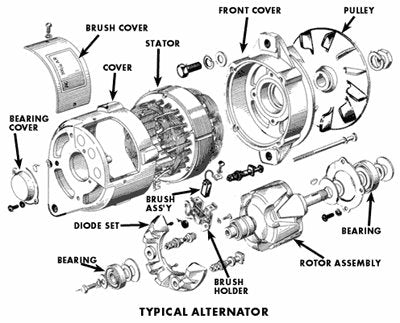Understanding the Importance of Your Car's Alternator: Everything You Need to Know
Posted by Hunt Parts on
So, What is Alternator?
An alternator is a key component in the electrical system of your vehicle. It is responsible for generating the electrical power that your vehicle needs to run all its electrical components, such as the headlights, radio, and windshield wipers.
An alternator is a type of generator that converts mechanical energy into electrical energy. This is done by using a rotating magnetic field to generate a current in a set of coils. The alternator is powered by the engine's crankshaft and is typically located on the front of the engine.
It is important to note that an alternator is not just a simple generator. It is a complex and sophisticated component that plays a critical role in the vehicle's electrical system. The alternator is designed to operate under a wide range of conditions and temperatures, and it must be able to produce the right amount of electrical power to meet the demands of the vehicle's electrical system.
What is the function of an Alternator?

Your alternator is a crucial component of your car's electrical system and is responsible for generating and maintaining the power needed to run all of your car's electrical systems, including the battery, the starter motor, the headlights, and more. Without a functioning alternator, your car will not start or run, and you could end up stranded on the side of the road.
The alternator's primary function is to charge the battery and supply power to the vehicle's electrical system while the engine is running. It also provides a stable source of voltage to the vehicle's electrical system, which helps to reduce the risk of electrical problems and ensure that all the electrical components in the vehicle are working properly.
In addition to generating electrical power, the alternator also plays a key role in the vehicle's charging system. When the alternator is generating power, it is also charging the battery. This helps to ensure that the battery is always fully charged and ready to provide power to the vehicle's electrical system when it is needed.
What are the signs that your Alternator is Not Working Correctly?
-
Warning Light: If you notice that the alternator warning light has illuminated on your dashboard, this is a clear sign that your alternator is not functioning correctly.
-
Dead Battery: If your alternator is not working correctly, your battery will not be charged, and you'll likely end up with a dead battery.
-
Dimming Lights: If you notice that your headlights or interior lights are flickering or dimming, this could be a sign that your alternator is not working correctly.
-
Engine Problems: If you're having trouble starting your engine or if it stalls while driving, this could be a sign that your alternator is not working correctly.
-
Strange Sounds: If you hear strange noises coming from under the hood, such as a grinding or squealing sound, this could indicate a problem with your alternator.
How to Check Your Alternator?
If you suspect that your alternator is not working correctly, there are several steps you can take to diagnose and fix the problem. Here are the steps you should follow:
-
Check the Battery: The first step in diagnosing an alternator problem is to check the battery. If your battery is dead, it could be due to a problem with your alternator or simply because your battery is old and needs to be replaced. To check your battery, use a multimeter to measure its voltage. If the voltage is less than 12 volts, your battery is dead, and you'll need to replace it.
-
Check the Alternator Drive Belt: If the drive belt that powers the alternator is loose, damaged, or worn, it could be preventing the alternator from working correctly. To check the drive belt, simply lift the hood of your car and inspect the belt for any signs of wear or damage. If the belt is loose, tighten it up. If the belt is damaged or worn, you'll need to replace it.
-
Check the Alternator Fuse: If the alternator fuse has blown, it could be preventing the alternator from working correctly. To check the alternator fuse, locate the fuse box under the hood of your car and locate the fuse for the alternator. If the fuse has blown, replace it with a new one.
-
Test the Alternator: To test the alternator, you'll need a multimeter. Connect the multimeter to the battery terminals and start the engine. The alternator should be producing between 13.5 and 14.5 volts. If the voltage is lower, it's a sign that the alternator is not working correctly.
In conclusion, the alternator is a critical component in the vehicle's electrical system. It is responsible for generating the electrical power that the vehicle needs to run all its electrical components, and it also plays a key role in the vehicle's charging system. If your alternator is having problems, it is important to have it inspected and repaired as soon as possible to ensure that your vehicle is operating properly and that you can continue to drive with confidence.
BUY PREMIUM QUALITY ALTERNATOR FOR YOUR CAR
Share this post
- 0 comment
- Tags: alternator, auto parts

